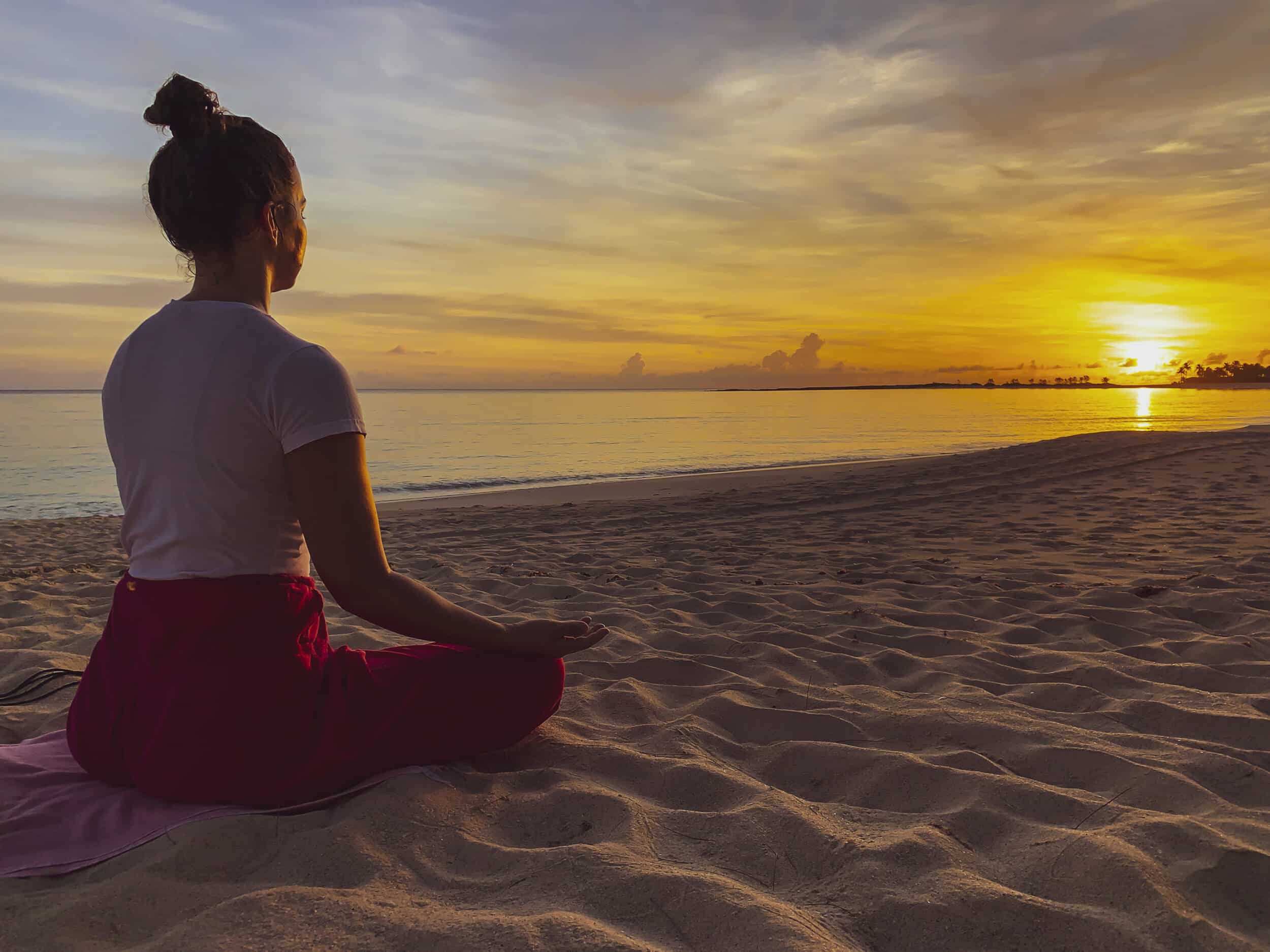Sivananda Bahamas Blog
Expand Your Horizons …
Our Blog
Yoga of Recovery: Why We’re Addicted and How Yoga Brings Back Balance
Today's world is one of addictions. In Yogic terms, we live in Kali Yuga, the Iron Age. This age is the 4th and worst of the four ages in a Yuga cycle. It is characterized by rampant conflict, suffering, and a complete lack of morals. Whether or not you believe in such characterizations, the description of Kali Yuga seems familiar when looking outwards at the world today.
As a result of the chaos we witness outwardly, one of the biggest conflicts all of us face is internal. In a fast-paced world, dependencies on various substances and outlets of pleasure are a given. How do we get through a hard day? Many of us turn on Netflix, or grab a chocolate bar, or stay up late browsing social media on our smart phones... more or less, we engage in behaviors that we know are bad for us. We engage in these behaviors to numb our minds from the stress of the day. Of course, the majority of us are also aware of how damaging these habits are. But we feel trapped in the cycle of stress and release through these outlets, going to bed filled with a belly of dissatisfaction and waking up the next morning feeling powerless to change the course of our own behavior.
The good news? Addiction is just another word for attachment. It is only natural for the human mind to get attached; attachment is unavoidable. What is avoidable is what we get attached to. Yoga is the bridge from unwanted dependency to healthy and happy attachment in moderation. In reality, we are the masters of our minds and our bodies. Yoga shows us the way to regaining control of our thoughts and actions. Yoga in combination with Ayurveda offers a holistic approach to treating addictions, dependencies, and attachments through natural pathways that feel good and do good to us on a mental, physical, and spiritual level. More than that, Yoga and Ayurveda are powerful tools on the road of recovery and healing from all issues related to addictions, eating disorders, dysfunctional families, intergenerational trauma, institutionalized racism, and suicide.

The Root of All Disease is Spiritual
The ancient sciences of healing found in Ayurveda and Yoga explain that the root cause of all disease (dis-ease) begin with us forgetting our true nature of spirit. When we forget about the Universal Intelligence and inherent divinity that resides within every single one of us, we see separation everywhere. With the notion of separation comes the feeling of being threatened, of striving towards impossible goals, of pushing ourselves beyond our means, and of grasping for always far-off greener pastures. In more concise words: if we base our identities on our bodies and minds, if we understand ourselves only as the body and mind, we experience the pain of limitation imposed on us by the nature of the physical world. When we overly identify with our physical bodies and minds, we don't just feel pain, we inevitably suffer from it—for the body and mind are bound to change, as it is in their nature to do so. We all seek happiness and we all seek permanent happiness. Yet, all of us still look for it within the body and mind, which are impermanent and bound by the laws of the physical world and rooted in change.
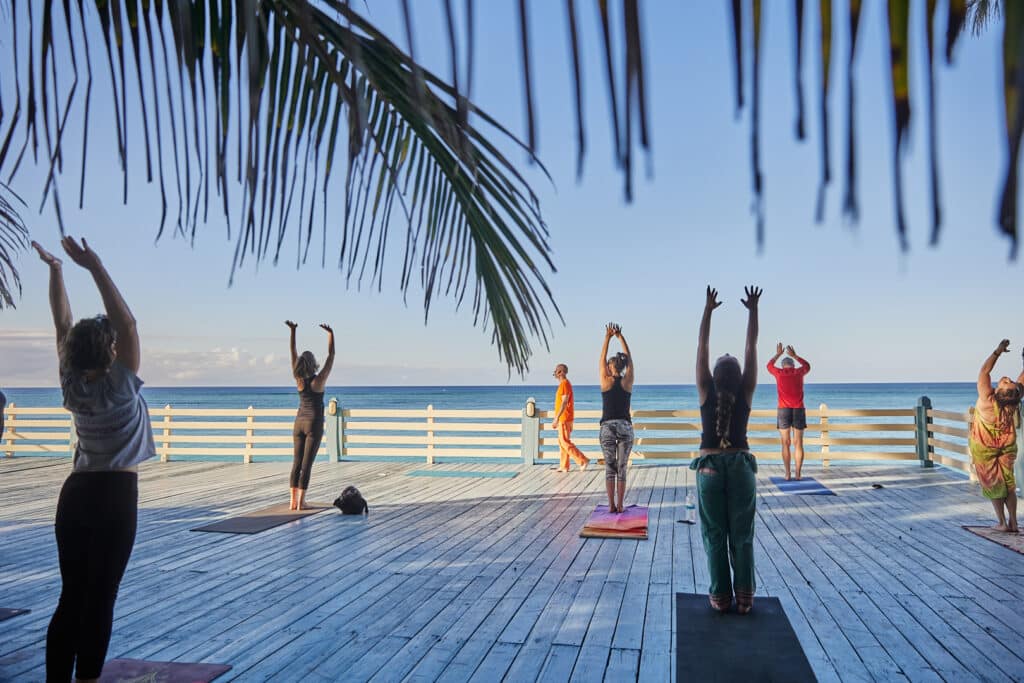
Whole-Body Healing with Ayurveda and Yogic Techniques
The 5 Points of Yoga
When Swami Vishnudevananda came to the West in the 1957, he observed the way of life and designed a yogic program based upon the struggles and suffering witnessed. He called this program the 5 Points of Yoga. This program offered a compact vision of Swami Sivananda's teachings distilled into digestible form. With some effort, these 5 points are easily applicable for even the most fast-paced and busy of us modern humans. By using this holistic system on its own and especially in conjunction with Ayurveda, we are bound to be successful in treating the root cause of our disharmony with the world, manifesting in our strong attachments and addictive tendencies to the material and the impermanent.
The 5 Points of Yoga are:
- Proper Exercise — The practice of āsana, the holding of steady and joyful postures.
- Proper Breathing — The practice of prānāyāma, the controlling/restraining (yāma) of the vital energy (prānā) via the breath.
- Proper Relaxation — The practice of śavāsana, a deep and conscious relaxation wherein the awareness is successively brought to each body part, using autosuggestion to relax said body part.
- Proper Diet — The practice of vegetarianism and brahmacharya, the moderation of the senses.
- Positive Thinking and Meditation — In Sivanada's yoga of synthesis system, this refers to both the practice of Vedanta (the end of all knowledge, the study of ancient Hindu scriptural texts that speak of the Highest Truths) and several practices outlined by Patañjali in the Yoga Sutras, including but not limited to: pratipaksha bhavana (discontinuing negative thinking by "cultivating the opposite"), dhāraṇā (one-pointed concentration of the mind), and dhyāna (contemplation and meditation).

Diving Deep into Yoga and Ayurveda: Understanding the 3 Gunas
In Ayurveda, the primordial cause of all disease, addiction, and disturbance in the mind and the body comes from forgetting your true nature as spirit. In Yoga, all disease, addiction, and disturbance in the mind and body is a form of spiritual ignorance (otherwise known as Avidyā). Both yogic philosophy and Ayurvedic psychology use the model of the 3 gunas to understand the mind and to bring it back into balance.
- The 3 gunas are the primordial forces, modes of existence, and qualities of nature.
- Everything that exists consists of a unique combination of the 3 gunas—including you!
- Ayurveda uses the 3 gunas to determine the mental and spiritual nature of your body, mind, the food you eat... just about everything!
The 3 gunas or qualities of nature are:
- Sattva, the quality of intelligence, purity, and goodness.
- Rajas, the quality of energy/activity.
- Tamas, the quality of materiality, inertia, and lethargy.
The goal of spiritual life is to cultivate sattva and to minimize rajas and tamas to the bare minimum. We need rajas and tamas to live in the world; we couldn't blink an eye without Rajas and we couldn't get to sleep without tamas. However, when rajas and tamas are out of balance, we experience mental disharmony. Excess rajas and tamas cause agitation and delusion and are often at the core of our suffering in the world; they are the root causes for our dependencies and addictions.
The mental disturbance caused by Rajas—excessive activity and energy in our frenetic modern world—is naturally counteracted by too much Tamas, which draws the mind and body away from truth and towards inertia, darkness, and ignorance. It is in this space that addictive behaviors flourish, utilizing the tamasic quality to calm us down from our overly-Rajasic lifestyles. For something to be considered sattvic, it should not contribute to disease or disturbance or evil. Sattvic foods and behaviors balance the mind and body and bring one back to the awareness of the unity underlying all things.
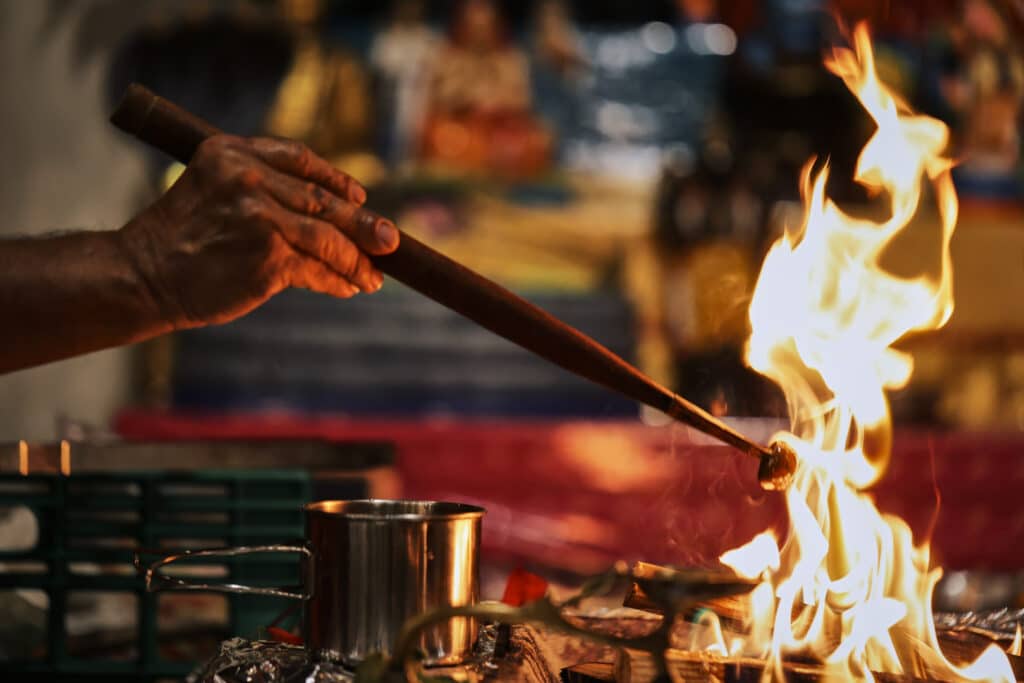
Diving Deep into Yoga and Ayurveda: The 3 Doshas and their Rajasic and Tamasic Tendencies
Ayurveda further defines our bodies and minds by the 3 doshas—elemental compositions that contribute to our behaviors and tendencies. While the 3 gunas refer to the spiritual quality of our bodies and minds, the 3 gunas are more physical and material in nature.
"The doshas are a biological classification that is horizontal in application, with no necessary spiritual implications. A Vata type may be a saint or a sinner, the same is the case with the other two types. The gunas are a spiritual classification that is vertical. It has no necessary. physical implications. A saint or a sinner may be Vata, Pitta, or Kapha in body." — Yoga and Ayurveda, David Frawley
There are 3 doshas in Ayurveda:
- Vata is composed of ether (or space) and air. It governs movement and communication.
- Pitta is composed of fire and water. Its oversees metabolism, digestion, and transformation.
- Kapha is composed of earth and water. It provides structure and lubrication.
Addictive Tendencies of the Doshas
"Vata people usually become addicted to substances that reduce their pain and insecurity. Pitta people adopt addictions that keep them at the high level of activity that they associate with success. Kapha people often fall into addiction with unawareness because of poor eating habits that they fail to change." — Prakriti, Robert Svoboda
Rajasic Tendencies of the Doshas (from Durga Leela's book, Yoga of Recovery)
- Rajasic Vata: Anxiety, overwhelm, ungroudedness, spaced out, worry, nervousness, rapid shifts of mood.
The colder emotions, and the mobility of the mind from the qualities of Vata—cold, light, dry, mobile. - Rajasic Pitta: Anger, aggression, criticism, blame, "hangry", frustration, competitiveness.
The qualities of Pitta—hot, light, oily, unstable, so we see more heated emotions. - Rajasic Kapha: Attachment, sentimental, unworthiness, guilt, seeking comfort with ease, wanting things without the hard work.
The heavier emotions from the qualities of Kapha—heavy, slow, stable.
Tamasic Tendencies of the Doshas (from David Frawley's book, Yoga and Ayurveda)
- Tamasic Vata: "Deceptive, fearful, and erratic behavior that easily becomes extreme, going against any order or courtesy. They are... easily addicted to drugs and other escapes and sometimes suicidal. They cannot be trusted with anything serious and play havoc with all whom they encounter."
- Tamasic Pitta: "[In Tamas, Pittas become] destructive and violent in their emotions and behavior. They harbor much hatred, resentment, and hostility in life and take it out on anyone who gets in their way. They do not respect any social laws or the feelings of others. Most criminal leaders and underworld figures are of this type. They may be paranoid or psychopathic and should be avoided at all costs."
- Tamasic Kapha: "Caught in inertia and stagnation which often manifests as various addictions. Their minds are dull and insensitive and they are usually depressed. They refuse to make efforts in life and are incapable of self-reflection, preferring to blame others for their predicaments. They trample over others in their heaviness and lethargy. Their bodies similarly are usually overweight and full of toxins."
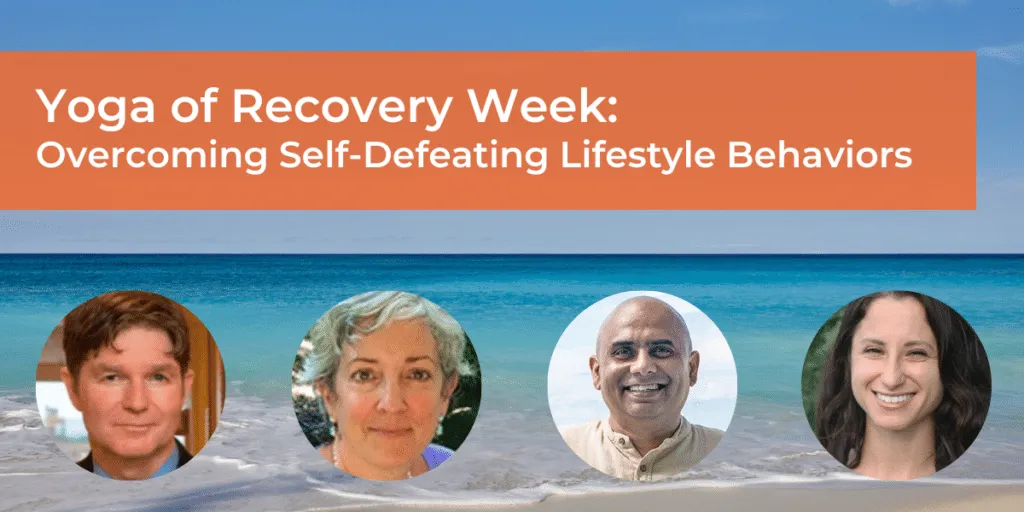
Yoga Week of Recovery at Sivananda Bahamas (May 2 - 6, 2023)
The information above only begins to touch upon the incredible wealth of knowledge offered by Ayurveda and Yoga in helping us heal from the many wounds of the world. The truth is that we are absolutely the masters of our bodies and minds. We just need the tools to be able to talk back control. Yoga and Ayurveda offer those tools.
If you are interested in learning more, we are offering an on-site program called Week of Recovery from May 2 to May 6, 2023.
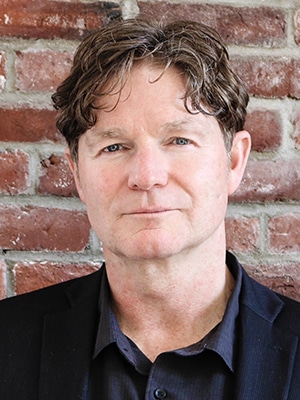
Dr. Kelly is the Elizabeth R. Spallin Professor of Psychiatry in Addiction Medicine at Harvard Medical School – the first endowed professor in addiction medicine at Harvard. He is also the Founder and Director of the Recovery Research Institute at the Massachusetts General Hospital (MGH), the Associate Director of the Center for Addiction Medicine (CAM) at MGH, and the Program Director of the Addiction Recovery Management Service (ARMS).
Dr. Kelly is a former President of the American Psychological Association’s (APA) Society of Addiction Psychology, and is a Fellow of the APA and a Diplomate of the American Board of Professional Psychology. He has served as a consultant to U.S. federal agencies and non-federal institutions, as well as foreign governments and the United Nations.
Dr. Kelly has published over 200 peer-reviewed articles, reviews, chapters, and books in the field of addiction medicine, and was an author on the U.S. Surgeon General’s Report on Alcohol, Drugs, and Health. His clinical and research work has focused on addiction treatment and the recovery process, mechanisms of behavior change, and reducing stigma and discrimination among individuals suffering from addiction.
Upcoming Courses
Learn about addiction treatment and the recovery process through the lens of both culture and science with Dr. John Kelly, the first endowed professor in sddiction medicine at Harvard University.

Durga Leela is an Ayurvedic and Yoga Therapy Specialist and the founder of Yoga of Recovery®, a comprehensive program that integrates Ayurveda and yoga with recovery tools for those affected by addiction and self-destructive behaviors. She teaches a holistic approach to recovery, integrating mind, body, and spirit. She overcame her own struggles with addiction and is a grateful member of 12-step fellowships for over 20 years. She is the author of Yoga of Recovery: Integrating Yoga and Ayurveda With Modern Recovery Tools for Addiction with a foreword by David Frawley.
Upcoming Courses
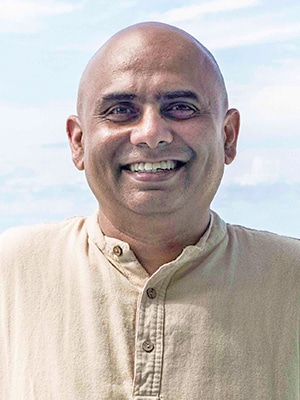
Dr. Ramkumar Kutty is a lifelong student of Ayurveda and other traditional Indian knowledge systems and an internationally renowned speaker. He is a founder-director of Punamava Ayurveda, and institution committed to universal wellbeing through authentic Ayurvedic practice. He works in collaboration with Yoga of Recovery, facilitating profound healing through cleanses and Panchakarma.
Upcoming Courses
Join this highly knowledgable and experienced group of practitioners for an exploration of Ayurveda, Yoga, Jyotisha, Vedic administration and various concepts that relate to them all, and how they are interconnected.

Katie Papo (Ambika) is best known for helping people create a healthy and peaceful relationship with food. She’s the host of the “Binge Eating to Food Freedom” podcast, reaching listeners in more than 120 countries.
Katie is a Sivananda Yoga teacher and longtime supporter of the ashram, leading many programs related to health, stress management, and relaxation techniques.
Upcoming Courses
Cultivate a stress-free, healthy, nurturing and peaceful and more effortless relationship with food, and with yourself.



